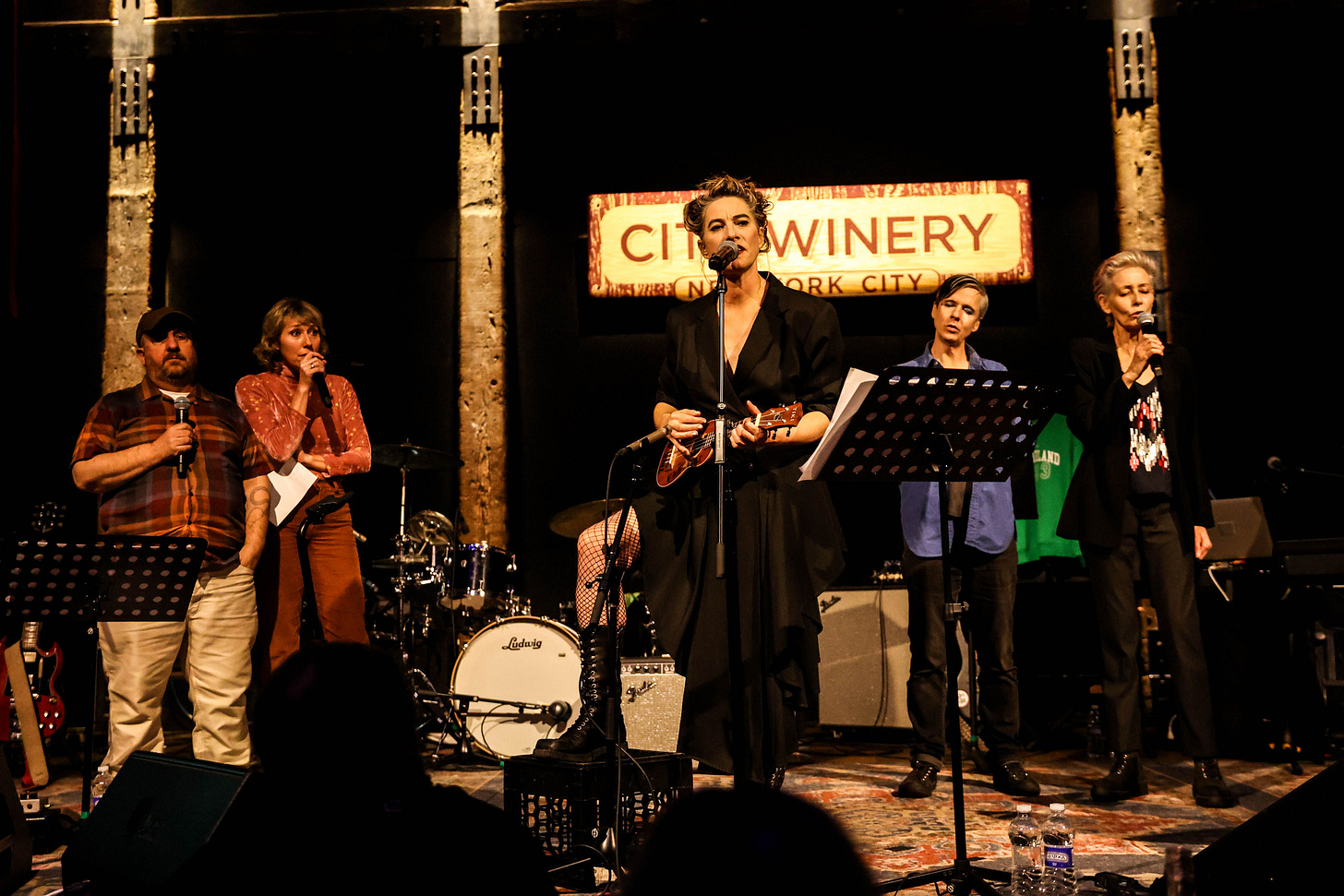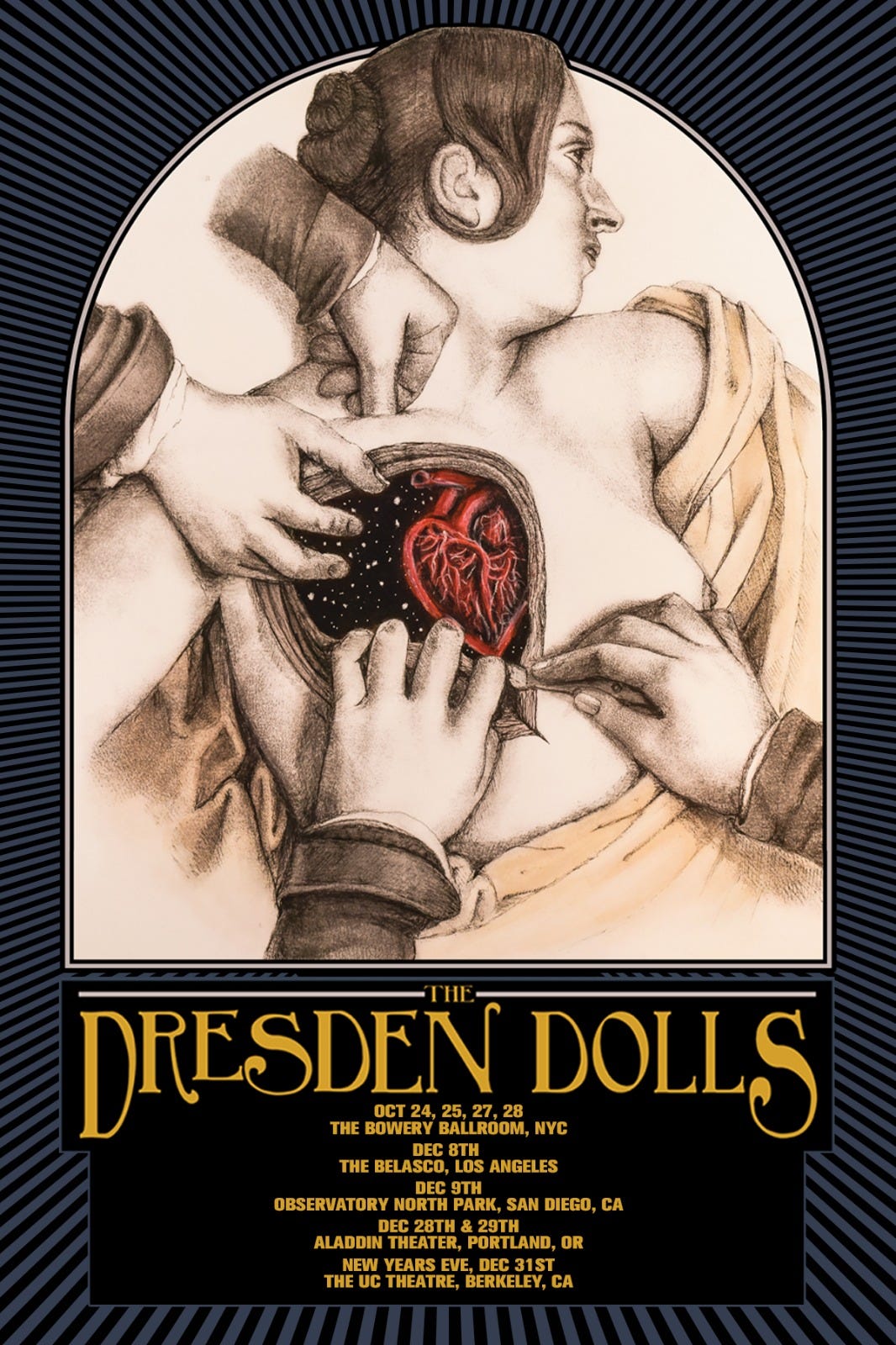REMEMBERING SINÉAD: CARE ABOUT YOUR MUSICIANS. WE NEED YOU.
My short speech at City Winery in NYC
This piece is mined from a short speech I gave at City Winery in New York on October 29, 2023, at an event called “Remembering Sinéad.” I followed it up by singing “Black Boys on Mopeds” with backup help from Stephin Merritt (The Magnetic Fields), John Cameron Mitchell (Hedwig and the Angry Inch), Martha Wainwright, and Joy Askew. I sent the video recording of the entire speech (including the performance of the song) to my patrons and to my paid subscribers here on Substack. You can upgrade to a paid subscription to watch it here.
These are dangerous days /
To say what you feel is to dig your own grave
—Sinéad O’Connor, “Black Boys on Mopeds”
Good evening, thank you so much for being here. It’s such a special night.
As a woman who has been canceled many, many times by the music industry,
{Audience laughter}
I just want to say something very brief about Sinéad and what it meant to me when she left us.
I grew up loving and worshiping her music, and listening to the words in her songs very carefully. I remember looking at her—I was just fourteen when I got I Do Not Want What I Haven’t Got—and what she ultimately stood for. When she passed away, I talked to a lot of people in the music industry about what happened in New York when she tore up that picture of the pope on Saturday Night Live.
Sinéad was canceled before there was the internet to cancel her, and it wasn’t just “general public opinion” that canceled her; it was also the industry itself.
Because at the end of the day, it doesn’t matter how brave and beautiful the public thinks you are if you don’t get the call for the gig. And, according to the music-industry people who were around at the time, she stopped getting the call for the gig from mostly everyone. The gig itself was not on offer; she was, in most circles, too dangerous to touch. The stage itself was taken away from her.
I think she had a really hard time recovering from that. And yes, she kept doing what she did. But the thing that I’ve been thinking about, since she left us, is this: What we do for a “job”—we emotional, heart-on-sleeve singer-songwriters—is so fucking weird.
{Audience laughter}
This job itself is so strange. To be—for a living, for a wage—a songwriter who sings about your hardest fucking feelings? Believe me, it’s a weird job.
And to do it the way she did it, to reach into your heavy heart and soul and to pull out your raw emotions, and to try and lay them in front of everyone in a way that has a value, and then—get this—to try to get paid for it? It’s real odd when you think about it.
But in the world we live in—late-stage capitalism—well, here we are. We have value, we artists. We keep being told that we do. And we have to pay rent, we have to eat, and to do that: we have to get the call for the gig.
So I just want to remind you: this value goes both ways. It’s also about you, the audience.
What we do is really strange, yes. And you can appreciate us, and you can pay 20 bucks for a CD, or a dollar for a download, or whatever, but it’s really—I think—impossible to put an exact “value” on what Sinéad did, what she truly gave to us.
{Applause}
Wouldn’t you agree? How can you put a price tag on the shivers you feel when you hear that voice, those words?
It’s not just her. It’s all of us. Look around. These musicians you see onstage tonight: they all still need to work, need to eat—we still need to get the call for the gig—and this is the value that you, the audience, bring.
If you’re sitting in this room, you probably care about music, and there are probably some people from the music industry here.
So please, don’t forget the basics. We are up here, trying to do this thing of value for you, but you also do this thing of value for us. You take the risk. You call us for the gig—even if we’re risky, even if we’re outspoken, even if we’re untouchable. You give us the stage, even if the stage gets messy.
I will speak for the women out there who are just trying to do this weird job…
{Applause}
…We need you. We need you to risk alongside us. And speaking as one who’s getting canceled on the internet right now for just trying to weigh in about current events, and calling for compassion,
{Applause}
I can say we need you now more than ever.
We cannot live like this. We can’t make art being this afraid to lose the gig.
This is already such a hard, weird job. We need you: you, the audience; you, the lovers of art; you, the people in the music industry itself.
We need you to defend us. To care about us. To care for us. To not treat us carelessly. To give us the stage, the gig.
If our music moves you, know that it doesn’t just come from nowhere. It comes out of us, out of our hearts, out of our lived experience and traumas, and it’s a fragile and inexact job, mining your emotions for the public’s ears and eyes.
Even when we love it, we pay a strange and hidden tax, doing this work. We need you to not treat us carelessly, so we can do this weird job. Because you know what? We don’t have to do this weird job.
But this is what we’re good at, and it can change the world if the world allows us to sing to our capacity, if the world allows us to open our mouths as wide as Sinéad’s. If we get the call for the gig.
So please, be gentle with us. Help us. We need you.
I’m going to sing you one of my favorite Sinéad songs. This record changed my life when I was a little songwriter.
And I wanted to ask you to sing with me at the end… you’ll know when. And I want you to send this singing—the sound of your voices—to Sinéad, and also to all the women out there who are having a hard time right now feeling cared about or cared for.
Thank you.
…………
If you’d like to care for the musician writing this, you can join the 17,000 people who support me directly on Patreon RIGHT HERE.
You can find photographs and a review of the entire Remembering Sinéad evening here in Magnet magazine. Above, from left: Stephin Merritt, Martha Wainwright, yours truly, John Cameron Mitchell, and Joy Askew.
Photographer: Ehud Lazin
……….
Upcoming talk in NYC—Friday, November 17th, 7 p.m.: “Life After Telling the Truth on Yourself,” at the Rubin Museum, with journalist Noor Tagouri. Tickets are HERE. A recording of this talk (and the others) will be available to my patrons.
Upcoming tour dates with my band, The Dresden Dolls:
DEC. 8TH - THE BELASCO, LOS ANGELES
DEC. 9TH - OBSERVATORY NORTH PARK, SAN DIEGO
DEC. 28TH & 29TH - ALADDIN THEATER, PORTLAND, OR
DEC. 31ST - NEW YEAR’S EVE - THE UC THEATRE, BERKELEY, CA
ALL TICKETS/INFO at DRESDENDOLLS.COM








The Magnet article is really good. So proud to support you, I love that you keep speaking out on behalf of artists. It's too easy to take art for granted, it's the wallpaper of our life many times. Someone makes all the art, and needs to get paid.
Sinead's rage and lyrics got me through my feelings around my dad's death. Especially at that time suicide was secret, and he essentially got deleted, 'disappeared' from my life. Sinead was the glue that held me together then, I learned many of her songs. She was a once in a generation talent. May her memory be a blessing, gratitude to the artists involved in her tribute.
Well said. We all need to take personal responsibility for how people in the public eye are treated in the media. If we are consuming the material that takes them down, or worse, contributing to it, we each have blood on our hands. It's too easy to forget the fragile humanity that exists behind the public persona ❤️